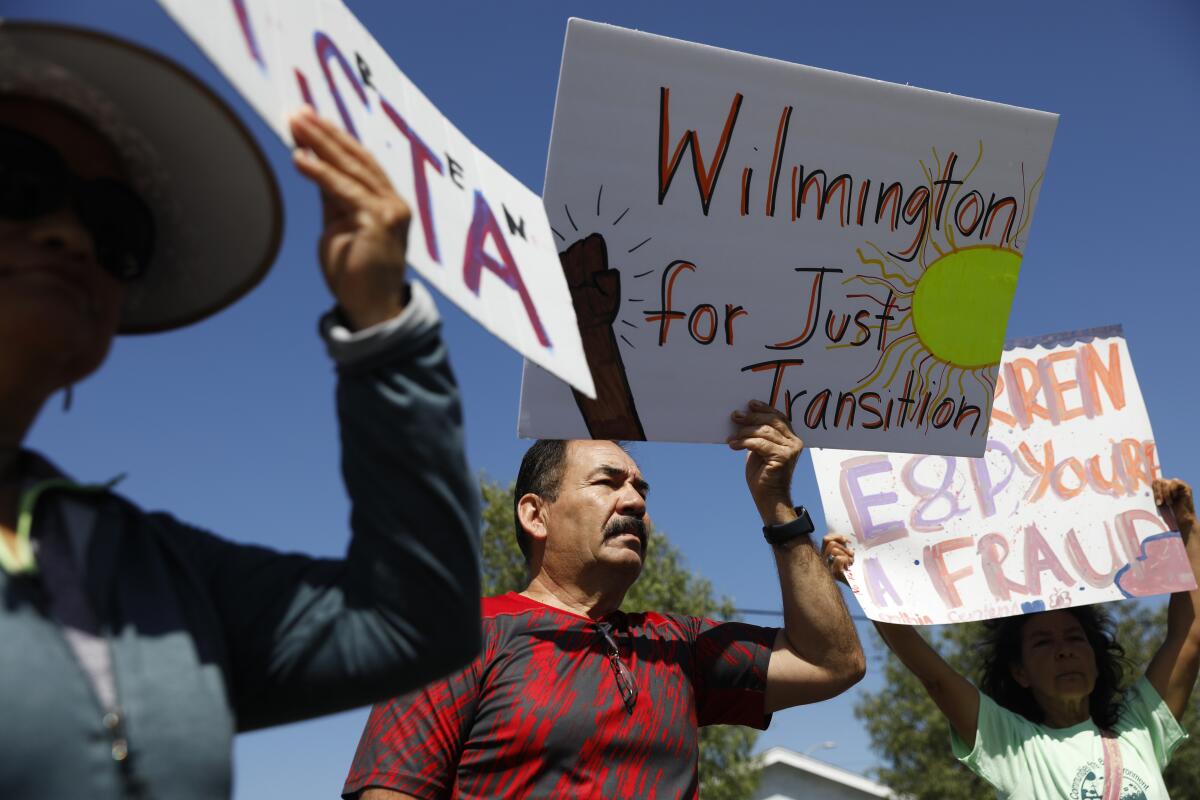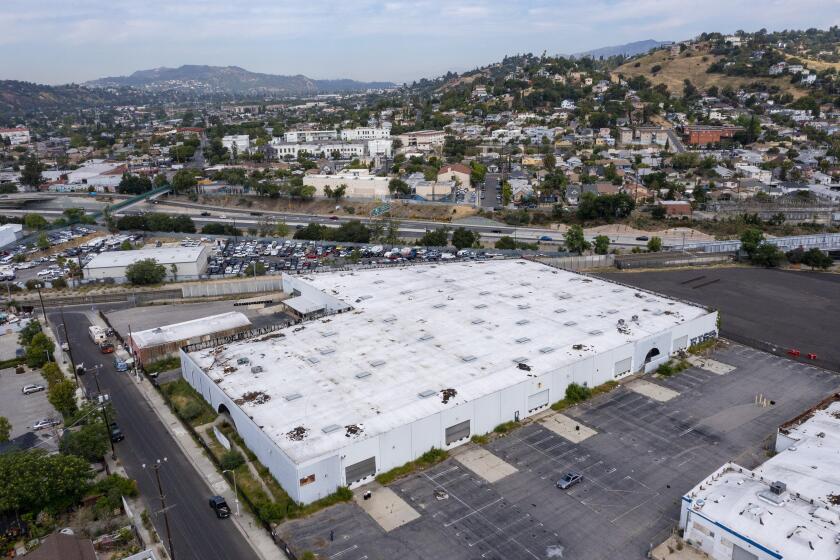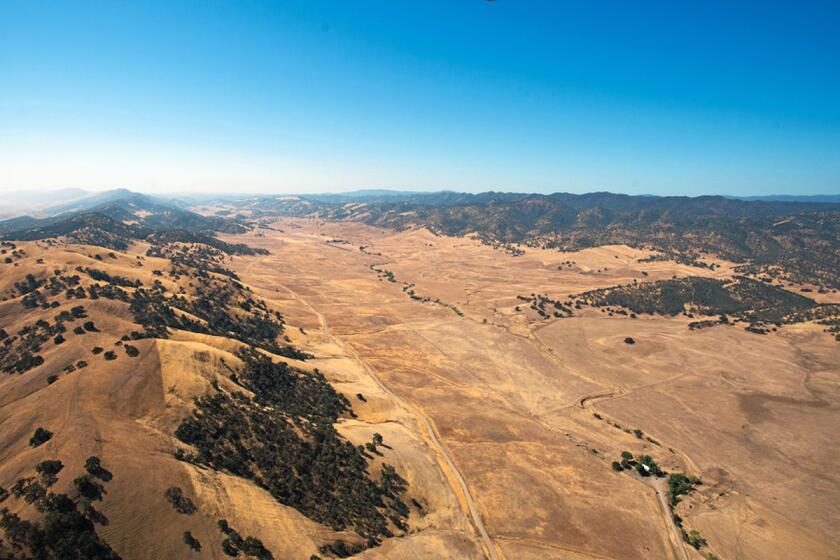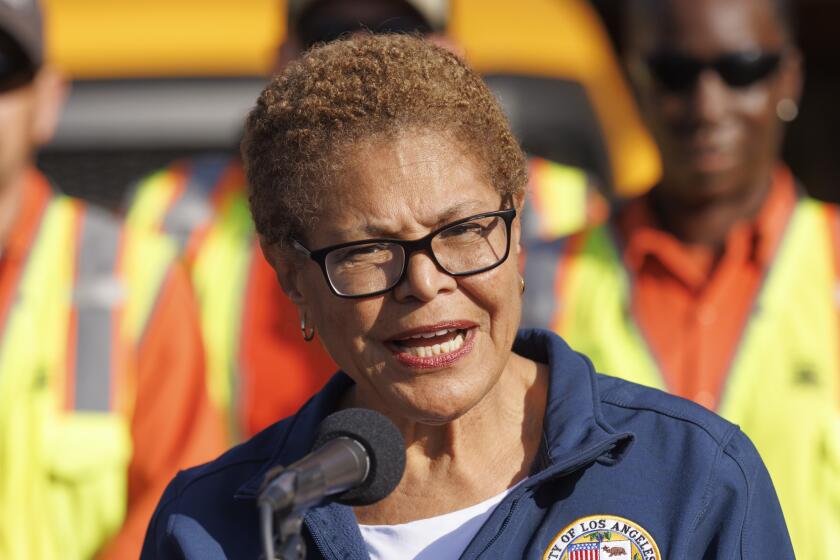State officials draw fire after approving new oil wells in L.A. neighborhood

- Share via
Los Angeles residents and environmental advocates are decrying a decision by state officials to allow new oil drilling in their Harbor-region neighborhood, saying the decision was based in part on expired city documents.
In the latest broadside against petroleum extraction in Los Angeles — the nation’s largest urban oil field — residents of Wilmington have accused Warren E&P of in effect evading proper environmental review. They are demanding that city officials block construction of up to six new wells approved by the state.
“We are surrounded by industries that are polluting our communities and have polluters right next to our homes, schools and parks,” resident Nizgui Gomez told reporters recently as she stood beside a community baseball diamond owned by Warren. “When I go on bike rides near this baseball field behind me and see the children exercising next to literal oil drilling operations that you could smell, I think about how dangerous it is on their health.”
The approval of new wells by state officials has not only angered Gomez and other residents, but it has also raised questions as to why state officials would grant approval based on outdated documentation and whether that approval is valid.
For its part, parent company Warren Resources Inc. said that to the best of its knowledge, it has complied with all city and state requirements governing its operations in Wilmington. “Warren has not drilled any new wells since 2018 in Wilmington and all wells drilled prior to that were done so with the City’s knowledge and approvals,” wrote Jessica Bradley, a company spokeswoman.
State toxic substance regulators are being called to task for their handling of a long-forgotten dump site in L.A.’s Lincoln Heights neighborhood.
Warren, which has pumped oil in the neighborhood since 1999, applied for 19 drilling permits with the California Department of Conservation, the state’s oil and gas regulatory agency, between December 2018 and December 2021, according to state records obtained by Communities for a Better Environment, an environmental nonprofit campaigning against urban oil drilling in Los Angeles.
However, Warren submitted its permit applications with a recently expired city approval, giving the appearance the city had signed off the company’s plans to bore new wells and deepen some others. The California Geologic Energy Management Division — a section of state’s conservation department known as CalGEM — approved 14 of those drilling permits.
It remains unclear why CalGEM issued permits with outdated paperwork or what the current status of these permits are. A state conservation department spokesperson said the agency is reviewing the company’s documentation.
The documents at issue date to 2006, when Warren received approval from the Los Angeles zoning administrator to drill 540 new wells over 12 years, so long as the company abided by conditions laid out in an environmental review approved by the city.
Warren contends there was no expiration date on those approvals. However, the Department of City Planning and environmental groups argue those permissions lapsed in August 2018, and a new environmental review and city approval were required for the new wells. That process would have included environmental impact assessments, public notices and public hearings.
The Sites Reservoir plan would flood a bucolic valley north of Sacramento. Environmentalists say it would do little to solve California’s water woes.
Instead, Warren was allowed to sidestep that process, opponents say.
“It’s hard to guess what could have happened,” said Alison Hahm, attorney for Communities for a Better Environment. “In a best-case scenario for communities, maybe the drilling would have been denied. Or maybe there would have been a real environmental review, a close assessment of all of the anticipated impacts and really strong mitigation measures to offset those impacts.”
The city will hold a public hearing to determine what actions may be taken in response to state approval, though it has not yet been scheduled.
The controversy comes at a time when city officials have vowed to phase out neighborhood drilling and the state has taken steps toward banning new wells within 3,200 feet of homes and schools. The restrictions come after decades of health complaints from residents who live close to extraction sites.
Among the air pollutants commonly associated with oil extraction are benzene, a carcinogen that’s commonly used in drilling fluid; and hydrogen sulfide, a pungent-smelling toxic gas and particulate pollution linked to serious respiratory and cardiovascular conditions.
Environmental health scientists and toxicologists have identified more than 40 DDT-related compounds accumulating in California condors.
“Thousands of pounds of chemicals are used for drilling, for extraction, for rework and conversions,” said Bahram Fazeli, director of research and policy at Communities for a Better Environment. “This is not an operation without impact. Oil drilling is an inherently unsafe operation.”
At a news conference Wednesday, dozens of community members and environmental activists gathered outside Warren’s Wilmington oil field to condemn lapses in the permitting process. U.S. Rep. Nanette Barragán (D-San Pedro) joined the chorus of criticism, calling the approval “a failure in the system.”
“There’s accountability across the board that needs to happen,” Barragán said. “How was it that somebody comes into this community and is allowed to just do this? And it continues without some immediate action to stop.”
A predominantly Latino community, Wilmington is a heavily industrialized area that hosts multiple refineries and hundreds of oil wells just north of the ports of Los Angeles and Long Beach. A number of residents told reporters they have developed asthma and suffer from chronic, allergy-like symptoms — ailments they suspect are tied to surrounding industry.
Growing up in Wilmington, Gomez said, she suffered from headaches and nosebleeds.
“As kids we grew up seeing and smelling these oil operations throughout our city and didn’t think twice about the impacts on our health. Now we can’t even smell them anymore,” Gomez said.
Other residents, such as Carlos and Guadalupe Diaz, voiced frustration over what they saw as a lack of government oversight.
The couple has lived a block north of Warren’s oil field since 1990, and say they have endured noxious fumes from well heads, drilling tremors so violent they have shattered windows and layers of accumulated grime on cars and window sills.
“I worry about the health of my family,” said Carlos Diaz said. “We hope the people in charge of public health would protect us.”







